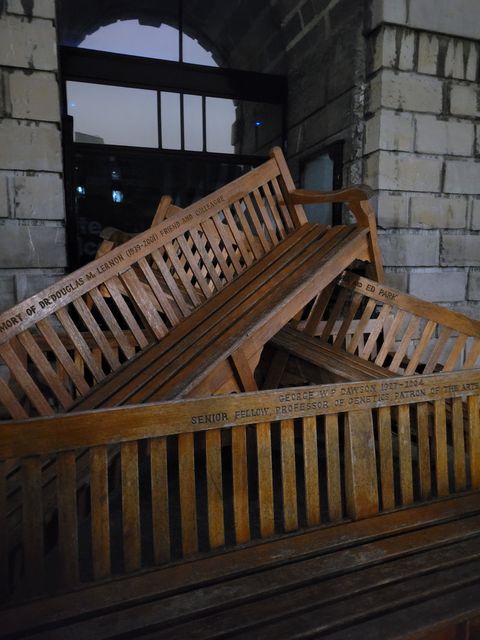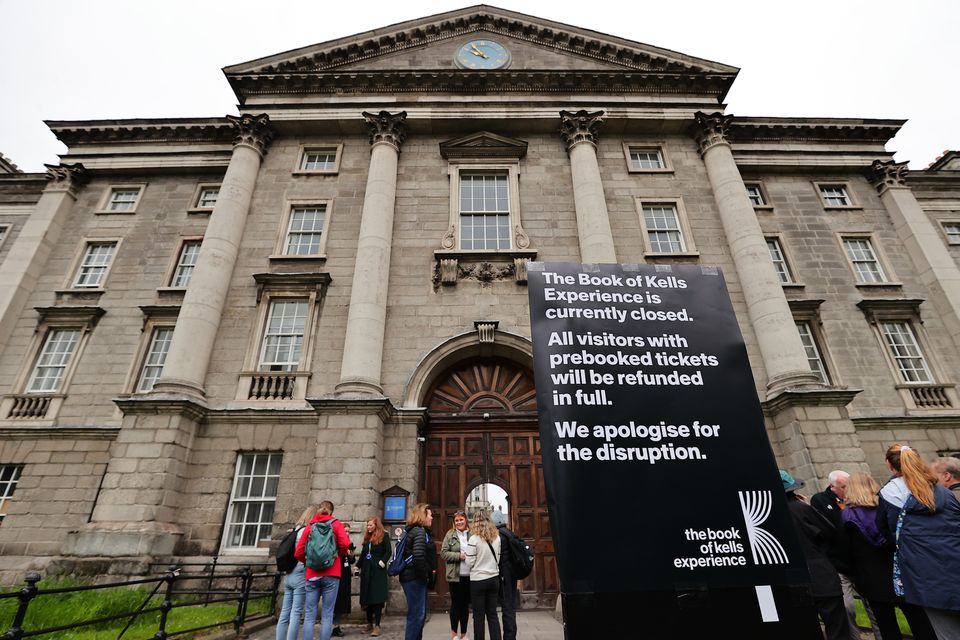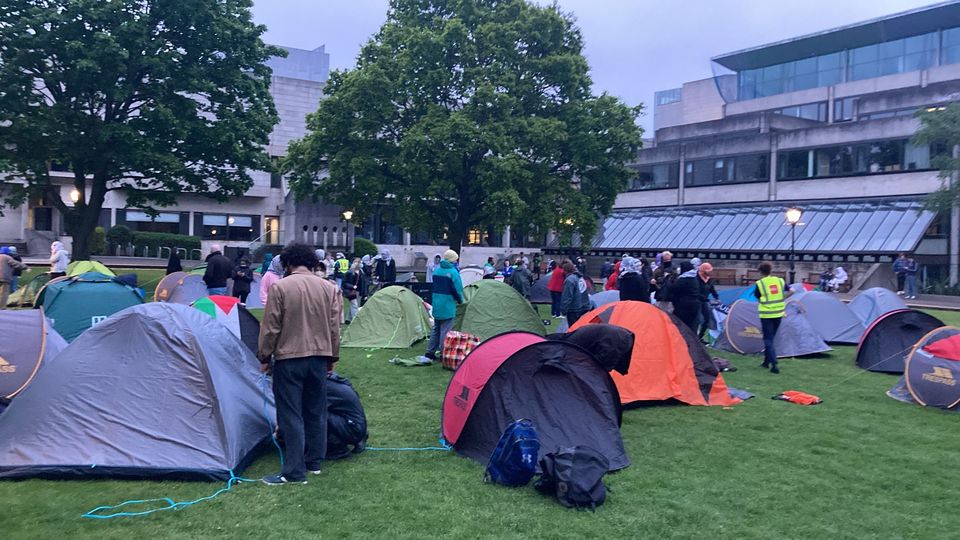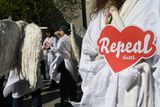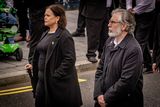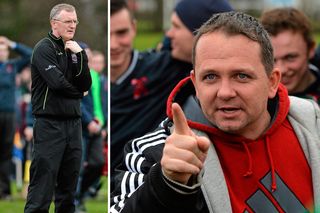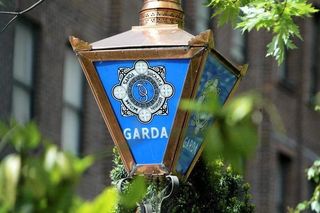Trinity student president: Why I’m risking my €20,000-a-year education to protest as Book of Kells is barricaded ‘indefinitely’
“My parents don’t know I am protesting yet…maybe they yell at me,” another student says
Trinity students vow to block Book of Kells until University cuts ties with Israel
The president of Trinity College Dublin Students’ Union László Molnárfi has said his parents are “definitely proud” he is risking his €20,000-a-year education to protest his college’s links to Israel.
Mr Molnárfi also defended barricading The Book Of Kells “indefinitely” because “it’s the only way to get a reaction” from the college.
Students at TCD kicked off a full-time occupation on the front lawn of the college, pitching over 40 tents overnight on Friday in a similar style to the demonstrations seen on college campuses in the United States in recent weeks.
As darkness fell, dozens of students met at Fellows Square and dragged wooden benches to the entrance of Ireland’s best-known cultural artefact before barricading the doors.
Park benches have blockaded the entrance to the Book of Kells. Photo: László Molnárfi/X
“Students at Trinity College Dublin have set up an encampment for Palestine, demanding that their university cut ties with Israel as per BDS [Boycott, Divest, Sanction] principles supported by the vast majority of students and staff,” Mr Molnárfi said.
Mr Molnárfi, who is originally from Hungary and studying in Trinity College Dublin, was speaking moments after security at the world-famous campus placed a heavy chain lock on the front gates on Saturday morning preventing all public access.
News in 90 Seconds - Saturday, May 4
From 9.30am, tourists from all over the world who had turned up to see The Book of Kells were immediately turned away. Some vocally supported the students’ protest, others were disappointed and some were visibly annoyed. Members of the media who were present were also forced to leave the university.
Mr Molnárfi said he was “risking my €20,000-a-year education” to protest Israel’s war in Gaza. He said this figure was the combined cost of tuition, housing and living expenses.
The entrance to Trinity College and the Book of Kells closed due to the students' Gaza protest. Photo: Gerry Mooney
"The cause of Palestine liberation is the greatest cause in the world. It is the cause of humanity and we can’t stand [by] as students and staff [when] our universities are complicit,” Mr Molnárfi said.
Asked why he believed he had a right to stop the public accessing one of Ireland’s most unique cultural artefacts, he said the students has been “politely asking” university throughout the year to cut ties with Israel but their pleas have been ignored.
“We are stopping the flow of money indefinitely and this is the only way to pressure our university into taking the steps that they need to take,” he said.
Fellow Irish student Caoimhe McSharry said she is protesting because she doesn’t want to remain passive while people die.
“When you learn about [World War Two] in history you ask these questions. Why didn’t anybody do anything? Why didn’t anyone stop it? It is happening today. And this is us stepping up and protesting. Students have always been on the right side of history,” she said.
Asked how her parents have reacted to the news she is risking her education, she said: “My parents don’t actually know I am doing this yet. They will either see this online or give me a call later or I will tell them once I set up my tent. Maybe they will yell at me a little bit. I will see how it goes.”
Trinity College Dublin (TCD) issued a statement in which it said that it “supports students’ right to protest within the rules of the university” but it said “access to campus is restricted to students, staff & residents with college ID.”
The encampment set up by Trinity students. Photo: László Molnárfi/X
That means all public access to Trinity College has now been restricted.
In a statement released on Saturday evening, a Trinity College spokesperson said the restricted access will also result in events being cancelled or postponed. The spokesperson said: “Regrettably, this will have a direct impact on our students and staff. Our libraries, Sports Centre, Book of Kells Experience, Old Library and the Pavilion Bar have been closed until further notice while sports fixtures, a concert and social events have been cancelled, postponed or moved to another venue.”
A large-scale protest marched towards Trinity College earlier on Saturday.
A message on the college’s booking platform for the Book of Kells Experience said it would be closed “due to circumstances beyond our control”.
In an online statement, TCD provost Linda Doyle said the college’s links to Israeli companies are not “hand-picked by Trinity but generated by our investment managers.
“Trinity has an Endowment Fund which includes investment in a portfolio of companies. The individual companies in this portfolio are not hand-picked by Trinity but generated by our investment managers based on investment parameters we set. As we learn more, we [will] find better ways to refine our portfolio.”
Ms Doyle added: "Currently, our selection of companies is guided by the UN Global Compact Violators List, the UN Level 5 Controversy List, and the ESG (Environmental, Social, Governance) performance of the company. Over the past few months, we have been doing further work and, as a result of this, the portfolio will be updated with reference to the UN blacklist.”
Students have also called for ties to Israeli academic universities be cut, but Ms Doyle said: “Academic freedom is the cornerstone of our identity as a university.
"It permits colleagues to collaborate with partners of their choosing, free from pressure from government, college authorities and other voices.
"Our commitment to academic freedom underpins the claim to autonomy that we make to government and wider society. I do not want to see the erosion of academic freedom in Ireland, in a way we have seen in other countries.”
Ms Doyle added: “Some in our community argue that Trinity should ensure all ties with Israeli institutions are cut. Such decisions rest with each individual academic. Some colleagues will see value in maintaining a free exchange of ideas; others will feel deeply uncomfortable having any relationship at all. Fundamentally, it is the right of the individual academic to make this decision, and no assumption about an academic’s political views should be inferred from those decisions.”
Join the Irish Independent WhatsApp channel
Stay up to date with all the latest news
